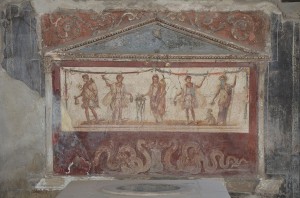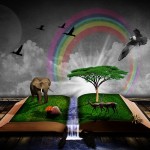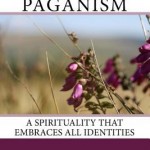I am a Wiccan and a polytheist, and I do not believe that the gods are merely archetypes. I believe the gods are real and have agency. I am not sure if the gods are made of energy or consciousness or both, but I am sure that they are distinct identities. I do not see any conflict between my polytheism and my Wicca.
In the UK and Europe, Gardnerian and Alexandrian Wicca do not have a standard theology. I have Wiccan friends who are polytheist, animist, henotheist, archetypalist, duotheist (an increasingly rare view in the UK and European Wiccan community), atheist, non-theist, and unclassifiable. I cannot speak for the USA, but I think the same is true there. American Wicca may be largely duotheist (I have insufficient data) but in the UK and Europe, I would say it is probably majority polytheist – though as I don’t often ask for people’s theology, I am not sure. But you can often tell by what people do in rituals. I am happy to do ritual with people with varying theological viewpoints, as long as they are respectful towards the deities and each other.
The key aspects of Wicca for me are that we practice in a circle – a symbol of the equality of all the participants (like King Arthur’s Round Table); that the circle becomes a microcosm to mirror the macrocosm (because we call the quarters); and that Wicca is both a religion and a magical practice. In other words, its purpose is to connect us with the numinous (religio, meaning to reconnect), and to transform us and the world for the better (that’s the purpose of the magic). Working skyclad is also really important to me, as a symbol of freedom and equality.

There are a few things in Wiccan liturgy (notably the opening words of The Charge of the Goddess) that make polytheist Wiccans feel awkward, so we either do not use them or keep our fingers crossed whilst saying them, or while others are saying them. In my own rituals, at home, I just don’t use the bits of liturgy that I don’t like. There are many different traditional words for casting the circle, calling the quarters, and so on, so there is plenty of choice, and many people have adapted them or written their own to suit their particular perspective. It is only when guesting with other covens that use those particular bits of liturgy that the issue occurs.
If you look at Wiccan liturgy, there are some bits that refer to multiple deities, and some that refer to two deities. However, Wiccan liturgy does not define or prescribe Wiccan theology; for one thing, the materials written by Gardner, Valiente, et al are not strictly duotheist; and for another, we have a lot of other material, written by many Wiccans. Thing is, most Wiccans in the UK, Europe, and Australia, write our own rituals, drawing on the body of existing material and on broader Pagan themes and ancient pagan source texts, so we can please ourselves as to the theology thereof.
I am aware that many 101 books on Wicca talk about “the Goddess” and “the God”. That is one of several reasons I wrote my book on inclusive Wicca – to empower polytheist Wiccans.
It would be really helpful if people did not deny the existence of polytheism in Wicca. It makes it hard to be polytheist and Wiccan when our existence is denied and erased. It doesn’t matter if you are a duotheist Wiccan who thinks every Wiccan should be a duotheist, or a Polytheist who thinks that all Wiccans are duotheist – the diversity of Wiccan theological perspectives says you are wrong.
The gods with whom I have a relationship are from several different pantheons, so Wicca provides a setting where I can honour them. As an English person, I have both Celtic and Saxon heritage – so why should I be forced to choose between those heritages?
The things that I love about Wicca are the combination of magical practice and entering into relationship with gods and spirits. I am a relational polytheist (a term coined by Niki Whiting and Aine Llewellyn) – I enter into relationships and alliances with the gods.
Niki Whiting writes of her approach to relational polytheism:
“I mean that we are in relationship with the gods and spirits – sometimes that means serving! Just as I serve my husband and children and friends from time to time. Building a shrine or altar is a form of hospitality wherein one is host and also serves, but as Anomalous Thracian says, we then become the guest to the entity that we host.
I am heavily influenced by feminist and process theologies, as well as Feri witchcraft, which all stress that we are co-creators of our world.
It’s a very simple idea, but has profound meaning for how we interact with our deities and this world. And for me ties into a way of being in the world that I am starting to shape my life around: that of radical hospitality.”
I love the idea that we are in a guest/host relationship with the gods, and the fact that the words for guest and host are derived from the same Indo-European root word. Hospitality is a sacred relationship.
Critiques of Wicca
I am critical of some aspects of Wicca, and would like to see Wiccans expand our understanding of polarity and fertility. Polarity can be created by any pair of opposites, not only a biologically male body paired with a biologically female body. Fertility does not have to involve making babies – it can be about creativity.
I believe that focussing exclusively on a goddess and a god (whether as a henotheistic practice within a broader polytheism, or as a duotheistic worldview) inherently excludes LGBT people. I also believe that it is disrespectful to the deities, and to the cultures that named them, to merge them together in a duotheist way. And most importantly, in my experience, deities are distinct identities with agency, in a similar way to humans, and therefore we can form alliances and relationships with them.
I would also like to see more engagement with the experience of resonance (a term coined by Ed Gutiérrez to describe the coming-together of several people’s energy).
However, just because I am critical of some aspects of my tradition, does not mean that I am not engaging with the tradition. Tradition evolves and develops in response to the needs of its practitioners. It is not fixed and unchanging. It is great to have a tradition to wrestle with, because this prevents one from merely doing whatever would most pander to one’s ego – but that does not mean that every critique of tradition is pandering to someone’s ego; it just means that we must exercise judgment.
Relational polytheism and Wicca
In his ode, Nemea, the classical poet Pindar wrote:
There is one race of men, one race of gods;
both have breath of life from a single mother. But sundered power
holds us divided, so that the one is nothing, while for the other
the brazen sky is established their sure citadel forever.
Yet we have some likeness in great intelligence, or strength, to the immortals,
though we know not what the day will bring, what course after nightfall
destiny has written that we must run to the end.
So, according to Pindar, humans and gods are related, and we have the “breath of life from a single mother”. This passage is part of the basis of my (relational) polytheism. The gods have different powers, being immortal – they are non-local and do not have a physical form. So they need our temporally-focussed and physically-located consciousness in order to be able to affect events in the physical world; and we need their eternal and non-local perspective in order to access the divine realms.
One of the many things I appreciate about Wicca is that the theology is fuzzy, and there is a greater focus on experience than on theology. If people and deities have a mutually satisfying encounter in a ritual, then I would regard that as a successful ritual. There is plenty of room for mystery in Wicca. We don’t know what the nature of the gods is, so all our theorising is probably inadequate, and most Wiccans acknowledge that. There is room for apophatic theology in Wicca: an acknowledgement that we don’t know everything about the gods, and that we only see the faces they choose to show us; that sometimes it may be more illuminating to say what the gods are not than to attempt to say what they are.
For me, Wicca is the religio-magical framework in which I engage with the gods and Nature. Wiccans are my tribe and I love them – even the ones who annoy me and/or who find me annoying. Polytheism is my theological perspective; and connecting and forming relationships and community is my ethos.
















